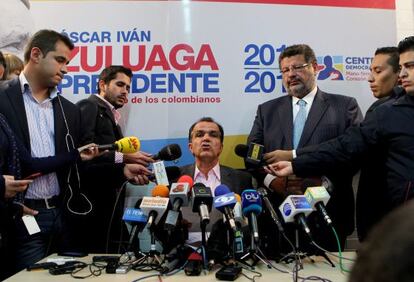Colombia’s Santos accuses rival of “sabotaging peace process”
But Democratic Center candidate claims slander campaign ahead of Sunday elections

A compromising video released last weekend is threatening the political future of Óscar Iván Zuluaga, the strongest rival to Colombian president Juan Manuel Santos in this Sunday’s presidential elections.
The footage shows Zuluaga, a vocal opponent of the government’s ongoing negotiations with the FARC guerrilla group, speaking in familiar terms with a hacker named Andrés Fernando Sepúlveda, who was recently arrested for intercepting FARC messages with details about the talks.
The Democratic Center candidate, who is the protégé of former president Álvaro Uribe, had publicly denied any personal connection with the hacker at the time of the arrest three weeks ago.
The video, which was shot in April using a cellphone, shows Zuluaga sitting back with his hands behind his head, while a hacker explains that he has access to military intelligence about FARC leaders that could be used to torpedo the dialogue in Havana. Zuluaga is heard saying: “Andrés, so what blow is Santos going to deliver between now and the 25th to save himself? There’s a month left to cause a sensation, brother.”
“What kind of espionage policy will there be when he has the intelligence service at his disposal?”
President Santos, of the Social Party of National Unity, on Sunday accused Zuluaga of trying to “sabotage the peace process.”
“I knew that there were enemies of peace, but I never thought we would see such extremes as committing crimes just to sabotage the peace process, killing the hopes of Colombians through illegal processes,” said the incumbent in an interview on Bluradio.
Hours earlier, the candidate for Green Alliance, Enrique Peñalosa, had asked Zuluaga to drop out of the race.
While Zuluaga is writing the whole thing off as slander campaign against him, the media have been critical. In an editorial, El Espectador wondered: “What kind of great espionage policy will there be when he has the state’s entire intelligence service at his service?”
The uribista candidate has stated that if he wins, the first thing he will do is to suspend all talks in Havana
But the pressure forced the Democratic Center candidate to appear in public on Monday to contain the damage and provide explanations for the video. After defining himself as “a family man of firm ethical and moral convictions,” he reiterated that the footage published by Semana magazine is a fake and that he has no intention of resigning.
He added that several experts are examining the images and noted that the release coincides with his rising popularity in the polls. “There could be new traps and videos to undermine our campaign,” he warned.
El Tiempo has identified the author of the video as a Spanish computer expert named Rafael Revert. According to the daily, Revert told authorities he was hired by the hacker Andrés F. Sepúlveda via Skype and flown to Bogotá to provide computer security for Zuloaga’s campaign. After a few days, however, Revert said he realized there was illegal activity going on, and decided to gather photographic, video and audio evidence.
Zuluaga is the candidate of a new party, the Democratic Center, which was founded a little over a year ago by former president Álvaro Uribe (2002-2010). Though much more famous and charismatic than his former finance minister, Uribe cannot run for re-election, but his tough stand on the FARC guerrillas is being faithfully maintained by Zuluaga, a 55-year-old economist and steel industry businessman.
The uribista candidate has stated that if he wins on Sunday, the first thing he will do is to suspend all talks in Havana and give the FARC a week to “end all criminal actions” if it wants to keep up the negotiations to end a 50-year-old conflict that has already caused over 200,000 deaths and nearly six million displaced persons.
Tu suscripción se está usando en otro dispositivo
¿Quieres añadir otro usuario a tu suscripción?
Si continúas leyendo en este dispositivo, no se podrá leer en el otro.
FlechaTu suscripción se está usando en otro dispositivo y solo puedes acceder a EL PAÍS desde un dispositivo a la vez.
Si quieres compartir tu cuenta, cambia tu suscripción a la modalidad Premium, así podrás añadir otro usuario. Cada uno accederá con su propia cuenta de email, lo que os permitirá personalizar vuestra experiencia en EL PAÍS.
En el caso de no saber quién está usando tu cuenta, te recomendamos cambiar tu contraseña aquí.
Si decides continuar compartiendo tu cuenta, este mensaje se mostrará en tu dispositivo y en el de la otra persona que está usando tu cuenta de forma indefinida, afectando a tu experiencia de lectura. Puedes consultar aquí los términos y condiciones de la suscripción digital.








































